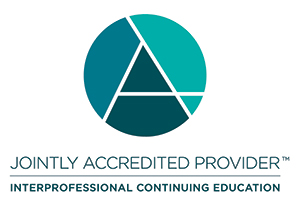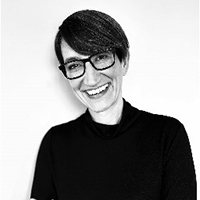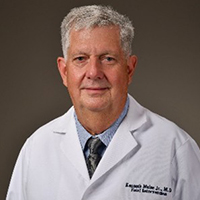Please note: AABB reserves the right to make updates to this program.
Wednesday, May 20, 2026
2:00 – 3:00 PM Eastern Time
Program Number: 26EL-636
Director/Moderator: Krystalyn E. Hudson, PhD, Associate Professor of Pathology and Cell Biology; Co-Director of the Laboratory of Transfusion Biology, Columbia University, New York, NY
Speaker: Kenneth J. Moise, MD, Professor of Women's Health; Director of Comprehensive Fetal Care Center, The University of Texas at Austin, Austin, TX
Hemolytic disease of the fetus and newborn (HDFN) arises when maternal IgG alloantibodies cross the placenta and target fetal red blood cells (RBCs), leading to their destruction and/or suppression. While anti-D alloantibodies are the most common cause—and can be prevented with anti-D immunoglobulin prophylaxis—HDFN can also result from other alloantibodies, such as those directed against the Kell blood group system, for which no approved prophylactic therapies currently exist.
An emerging therapeutic approach for HDFN involves targeting the neonatal Fc Receptor (FcRn), a key regulator of IgG homeostasis and transplacental IgG transfer. FcRn protects IgG from lysosomal degradation and mediates its transport across epithelial barriers, including the placenta. Inhibiting FcRn accelerates IgG degradation and may reduce maternal IgG antibody from reaching the fetus, thereby attenuating HDFN severity. This program will review FcRn biology, the current clinical landscape of FcRn-targeted therapies in HDFN, and potential applications of FcRn inhibition in other antibody-mediated hematologic disorders.
After participating in this educational activity, participants should be able to:
Registration includes access to both the live and on-demand version of this eCast.
If you are a facility interested in participating in this eCast, simply complete the Group Viewing registration form and AABB will provide detailed instructions to share with your team approximately one week prior to the live program (each team member to register for the program utilizing a promocode). For single viewers, simply click on the Register button below to register.
Please note: registration for the live eCast will close 1 hour prior to the eCast start time. If you register after this time, you will receive access to the on-demand eCast when it is available.
| Single Viewer | Register |
| Group Viewing | Register |
This activity is eligible for one (1) continuing education credit/contact hour for Physicians, California Nurses, California Lab Personnel, Florida Lab Personnel and General Participation credit. AABB reserves the right to reduce or increase the number of credits granted based on the final activity duration. For more information on each credit type please visit our Continuing Education Credits webpage.
There is no financial support for this activity.

In support of improving patient care, this activity has been planned and implemented by the Association for the Advancement of Blood & Biotherapies (AABB), which is jointly accredited by the Accreditation Council for Continuing Medical Education (ACCME), the Accreditation Council for Pharmacy Education (ACPE), and the American Nurses Credentialing Center (ANCC), to provide continuing education for the healthcare team.
Physicians (ACCME): AABB designates this live activity for a maximum of one (1) AMA PRA Category 1 CreditTM. AABB designates this enduring activity for a maximum of one (1) AMA PRA Category 1 CreditTM. Physicians should claim only the credit commensurate with the extent of their participation in the activity.
Claiming Credit
Live Activity - Upon completion of the live activity, you will receive instructions to complete your evaluation, which is necessary to claim credit and receive your certificate of attendance/completion (credit must be claimed by the date provided in the instructions). The evaluation can be found by logging into the AABB Education Platform.
Enduring Activity - Once the enduring (on-demand) program is available, you will receive instructions to access the AABB Education Platform. Upon completion of viewing the enduring activity, you will need to complete the evaluation, which is necessary to claim credit and receive your certificate of completion (credit must be claimed by the date provided in the AABB Education Platform).
Program & Credit Expiration Dates:
Disclosure Declaration
It is the policy of the Association for the Advancement of Blood & Biotherapies to ensure independence, balance, objectivity, and scientific rigor and integrity in all of its CE activities. Faculty must disclose to the participants any relationships with commercial companies whose primary business is producing, marketing, selling, re-selling, or distributing healthcare products used by or on patients. AABB has evaluated, identified, and mitigated any potential conflicts of interest through a rigorous content validation procedure, use of evidence-based data/research, and a multidisciplinary peer review process. The following information is for participant information only. It is not assumed that the presence of such relationships will have a negative impact on the presentations.
Disclosures for the planners of this event can be found here. Disclosures for the program faculty, peer reviewers, and AABB personnel are provided at the beginning of the program.
 Dr. Krystalyn E. Hudson is an Associate Professor and Co-Director of the Laboratory of Transfusion Biology at Columbia University. She received her PhD in Immunology from Emory University and completed her postdoctoral fellowship at The Scripps Research Institute. Dr. Hudson leads an NIH-funded research program aimed at unraveling the complexities of immune responses to red blood cells (RBCs), including both autoimmunity and alloimmunity, with implications for transfusion medicine, pregnancy, and transplantation. Her team has made seminal contributions to the field, including the development of two innovative murine models of autoimmune hemolytic anemia (AIHA), which revealed a critical three-week tolerization window for RBC-autoreactive T cells, identified a novel T cell subset predictive of tolerance failure and AIHA onset, and uncovered new therapeutic targets. In parallel, her laboratory recently discovered that patients with sickle cell disease retain functional mitochondria in mature RBCs—an abnormality that may contribute to alloantibody production. Building on this observation, they demonstrated that mitochondria-containing reticulocytes enhance RBC alloimmunization.
Dr. Krystalyn E. Hudson is an Associate Professor and Co-Director of the Laboratory of Transfusion Biology at Columbia University. She received her PhD in Immunology from Emory University and completed her postdoctoral fellowship at The Scripps Research Institute. Dr. Hudson leads an NIH-funded research program aimed at unraveling the complexities of immune responses to red blood cells (RBCs), including both autoimmunity and alloimmunity, with implications for transfusion medicine, pregnancy, and transplantation. Her team has made seminal contributions to the field, including the development of two innovative murine models of autoimmune hemolytic anemia (AIHA), which revealed a critical three-week tolerization window for RBC-autoreactive T cells, identified a novel T cell subset predictive of tolerance failure and AIHA onset, and uncovered new therapeutic targets. In parallel, her laboratory recently discovered that patients with sickle cell disease retain functional mitochondria in mature RBCs—an abnormality that may contribute to alloantibody production. Building on this observation, they demonstrated that mitochondria-containing reticulocytes enhance RBC alloimmunization.
 Dr. Kenneth J. Moise, Jr, is Professor of Women's Health at Dell Medical School. He also serves as the Director of the Fetal Care Center at Dell Children's Hospital. Dr. Moise completed his residency in Obstetrics and Gynecology at Vanderbilt University followed by a fellowship in Maternal-Fetal Medicine at Baylor College of Medicine. Dr. Moise is the former Director of Maternal-Fetal Medicine at Baylor College of Medicine and at the University of North Carolina School of Medicine. He is the former President of the International Fetal Medicine and Surgery Society and served for many years as the Treasurer/Secretary of that organization. He is a founding member of the North American Fetal Treatment Network (NAFTNet) having served on its executive board and its steering committee. He is board certified in general Obstetrics and Gynecology as well as Maternal-Fetal Medicine. Dr. Moise's interest in fetal therapy spans a 30-year period. He is recognized world-wide for his contributions in the fetal treatment of Rh disease including the development of middle cerebral artery Doppler for the non-invasive detection of fetal anemia and the use of free fetal DNA to determine the fetal RHD status in the U.S.. He was instrumental in the formation of the three previous fetal centers – the Center for Maternal and Infant Health at the University of North Carolina, the Texas Children's Fetal Center in Houston and The Fetal Center at Children's Memorial Hermann Hospital in Houston. In 2019, he was awarded the Lifetime Achievement Award by the Society for Maternal-Fetal Medicine for his work in hemolytic disease of the fetus and newborn.
Dr. Kenneth J. Moise, Jr, is Professor of Women's Health at Dell Medical School. He also serves as the Director of the Fetal Care Center at Dell Children's Hospital. Dr. Moise completed his residency in Obstetrics and Gynecology at Vanderbilt University followed by a fellowship in Maternal-Fetal Medicine at Baylor College of Medicine. Dr. Moise is the former Director of Maternal-Fetal Medicine at Baylor College of Medicine and at the University of North Carolina School of Medicine. He is the former President of the International Fetal Medicine and Surgery Society and served for many years as the Treasurer/Secretary of that organization. He is a founding member of the North American Fetal Treatment Network (NAFTNet) having served on its executive board and its steering committee. He is board certified in general Obstetrics and Gynecology as well as Maternal-Fetal Medicine. Dr. Moise's interest in fetal therapy spans a 30-year period. He is recognized world-wide for his contributions in the fetal treatment of Rh disease including the development of middle cerebral artery Doppler for the non-invasive detection of fetal anemia and the use of free fetal DNA to determine the fetal RHD status in the U.S.. He was instrumental in the formation of the three previous fetal centers – the Center for Maternal and Infant Health at the University of North Carolina, the Texas Children's Fetal Center in Houston and The Fetal Center at Children's Memorial Hermann Hospital in Houston. In 2019, he was awarded the Lifetime Achievement Award by the Society for Maternal-Fetal Medicine for his work in hemolytic disease of the fetus and newborn.